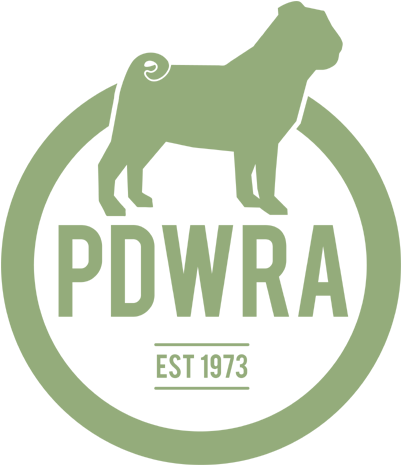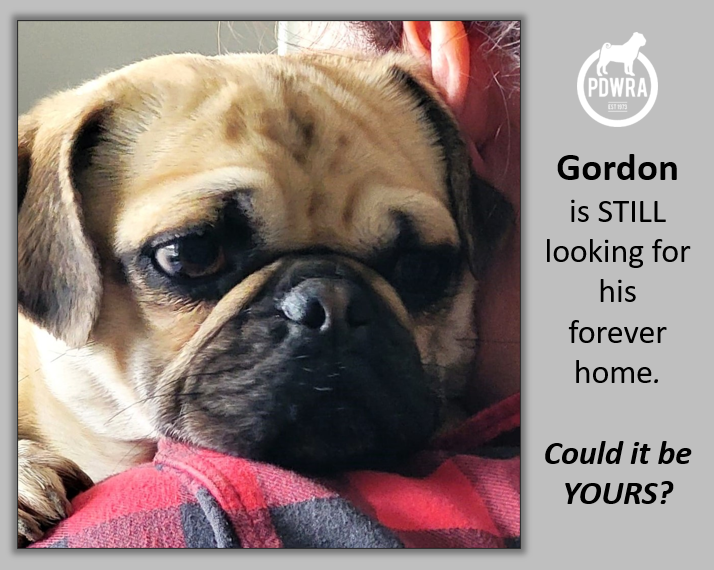
by Yasmin | 7 Apr, 2024 | Blog, News, Rescue Stories
**UPDATE: Gorgeous Gordon found his forever home following this appeal, and is settling in well sneaking snuggles with his new pug sister!**
********
We can’t believe this lovely boy, Gordon, hasn’t found his Forever Home yet!
For full details about 2.5 year-old Gordon please see his original appeal post, and how to apply: https://pugwelfare-rescue.org.uk/good-friday-gordon-is-appealing-for-his-forever-home/
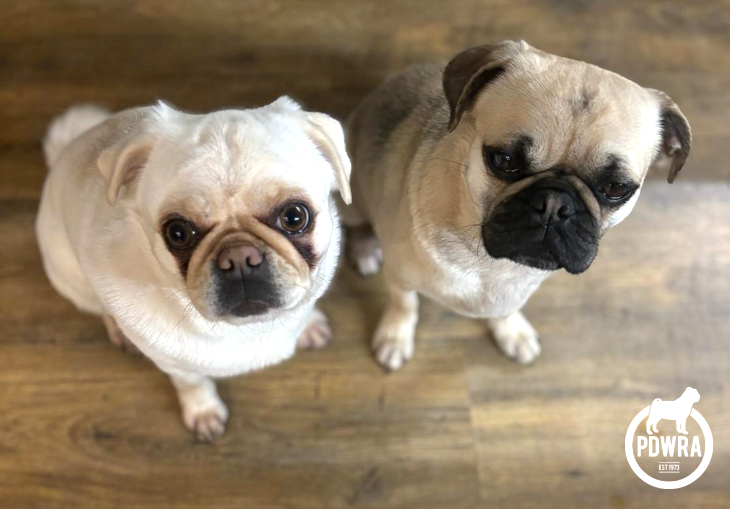
Here he is looking pensive and hoping it will come soon, too!
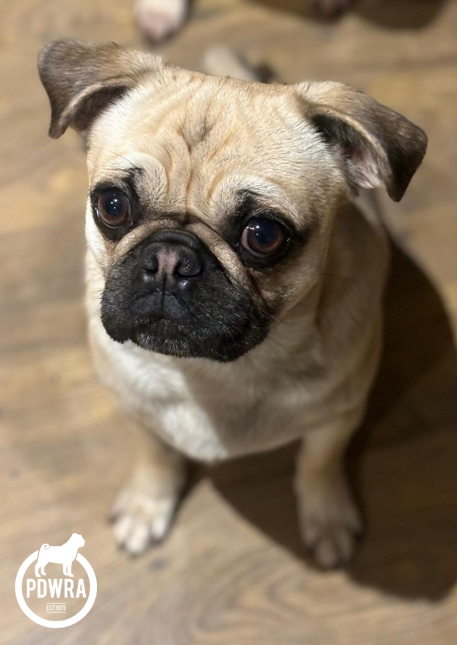
Meanwhile, please enjoy these delightful images of him being so well taken care of, in foster, while you consider if you, or someone you know, might be able to take him into your hearts and home.
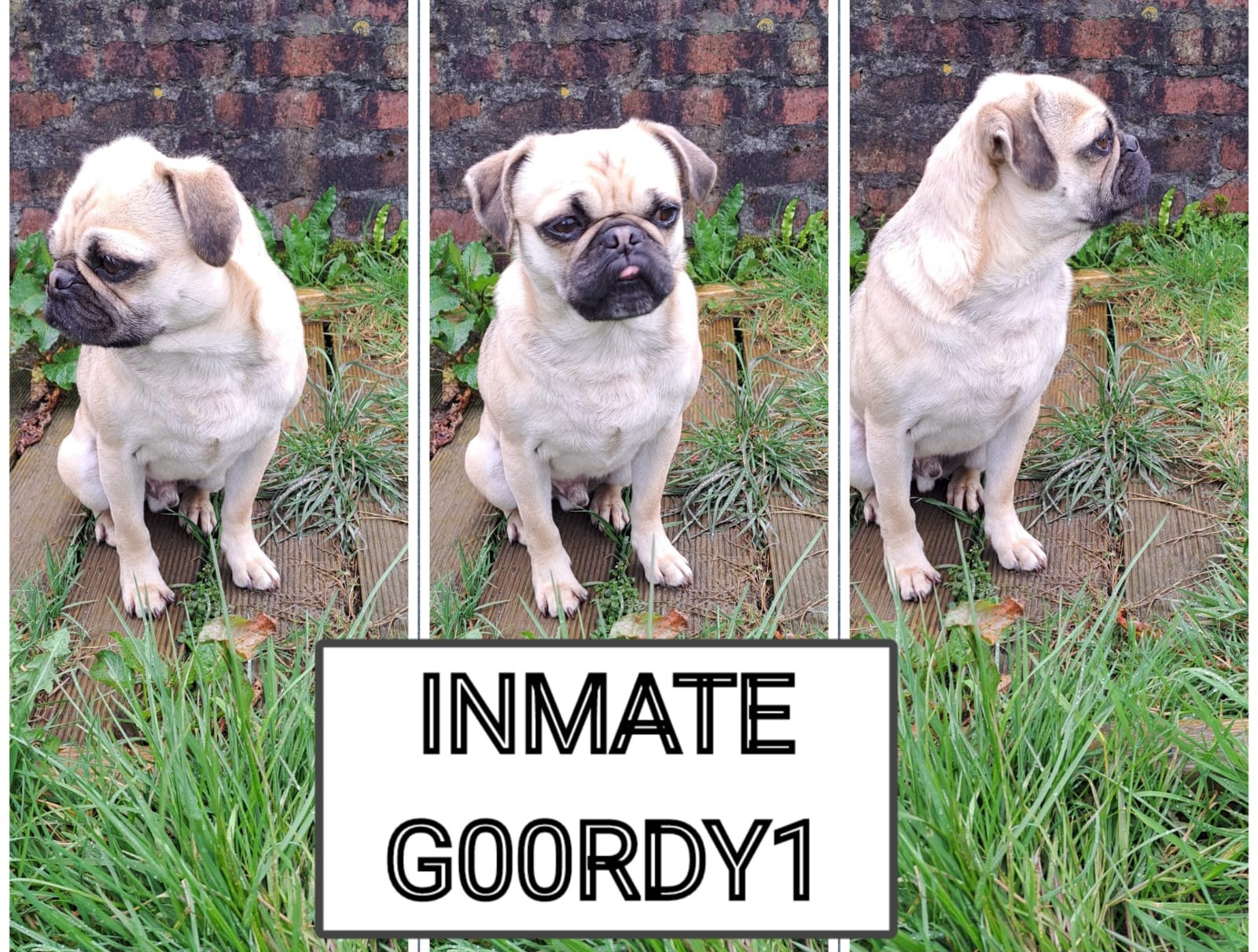
Gordon’s foster parents having some fun at his expense!
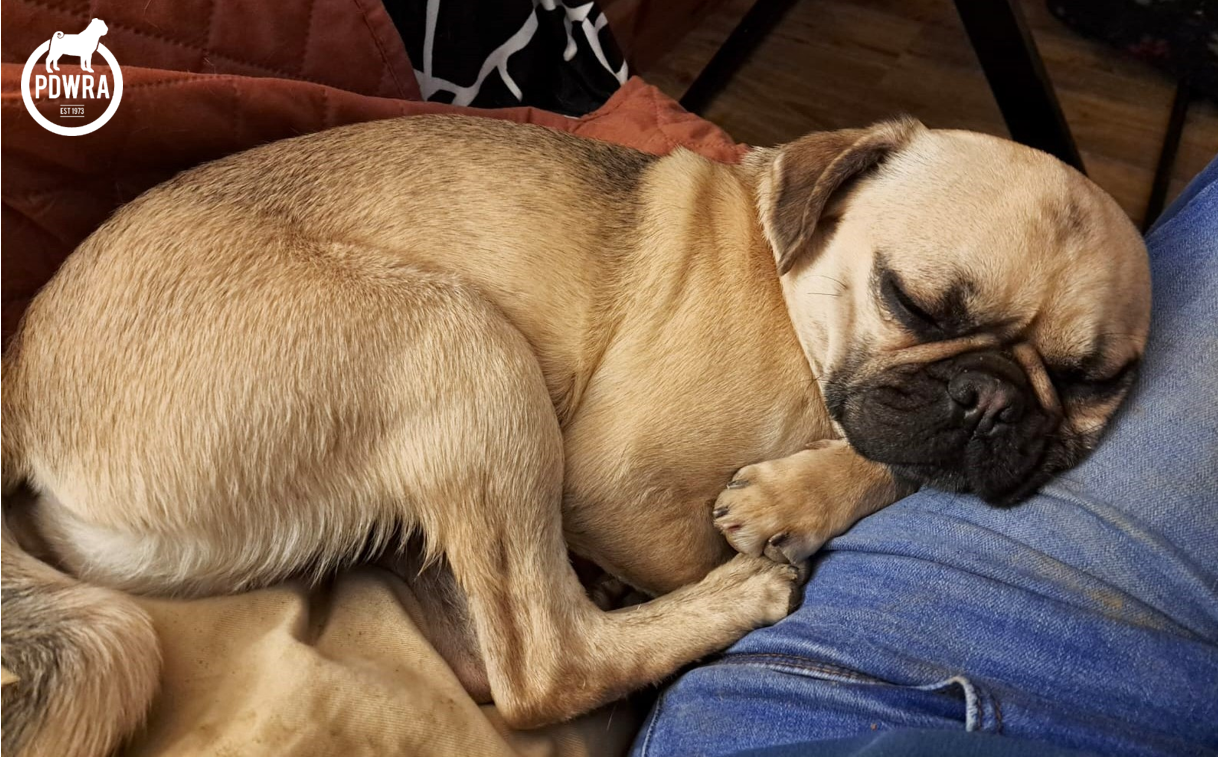
At the end of the day, when all his energy has been exerted!
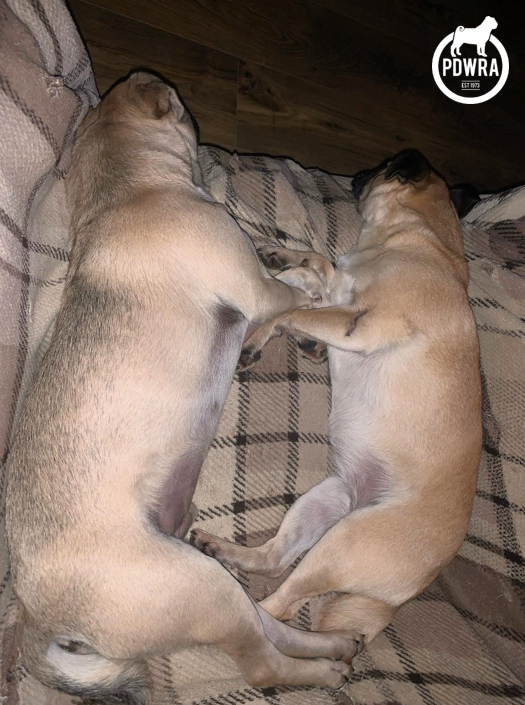
And with the right companion, unfortunately not another boy, for peace & harmony for everyone!
Good Friday Gordon is appealing for his Forever-Home! | The Pug Dog Welfare & Rescue Association (pugwelfare-rescue.org.uk)
Adoption | The Pug Dog Welfare & Rescue Association (pugwelfare-rescue.org.uk)
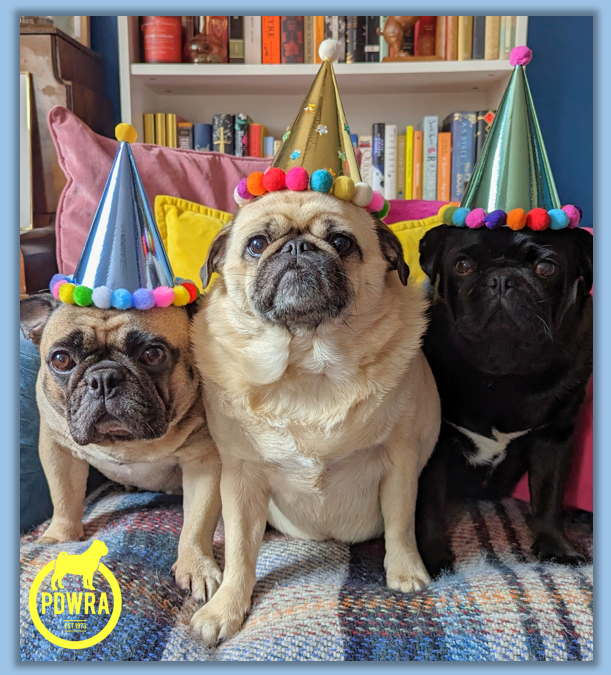
by Yasmin | 6 Apr, 2024 | Blog, News, Rescue Stories
Carolyn firstly adopted Frug Maverick in November 2021 as a companion to Martha, her French Bulldog and Beyonce, her Pug. Sadly, Martha and Beyonce both passed away at the end of 2022 and not wanting Maverick to be on his own she then adopted bonded pair Elsie and Frank in January 2023.
In her interview, here, Carolyn talks about the adoption process and how grateful she is to the PDWRA for helping to make it all happen. She also talks about their special unique characters and how well they all get along!
How did you hear about the PDWRA?
I have always rescued my pets and the PDWRA was on my radar after I saw some posts on Instagram from people who had fostered and adopted with them. It looked like a well-run organisation (it is!)
How did you come to make the decision to adopt through the PDWRA?
At the time I had Martha, my French bulldog and Beyonce the pug from two other rescues, but we wanted a little boy dog for them to play with. We saw the PDWRA were looking for homes, so got in touch.
It was lockdown when PDWRA’s Lisa contacted us about Maverick, and a virtual home check was conducted, then restrictions were being lifted so we were lucky enough to arrange to meet him with his foster. We knew we needed to meet him from the very first photo Lisa sent us.
When did you adopt Elsie, Maverick, and Frank?
Maverick came to live with us in November 2021, Elsie, and Frank in January 2023. Martha and Beyonce sadly both passed at the end of 2022, leaving Maverick on his own, but he loves having friends and we had more love to give, so we reached out to Lisa.
What made you decide to adopt Maverick after Elsie and Frank? – This was the other way around!
Maverick was so different to my other rescues, who had always been older lady pugs. I didn’t even know what a Frug was! When we adopted him, he had needed some surgeries, which were covered by the PDWRA. He was young and so springy. He clearly had a lot of energy, but Beyonce and Martha liked that so we weren’t worried that he would be too much for them. He’s also clearly the most handsome dog in the world. We had to take him home and love him.
Elsie and Frank were a bonded pair, but we are used to three dogs at home, and we liked that they were the same age as Maverick. He loves having siblings that have the same energy levels as him. They are all seriously in love with one another.
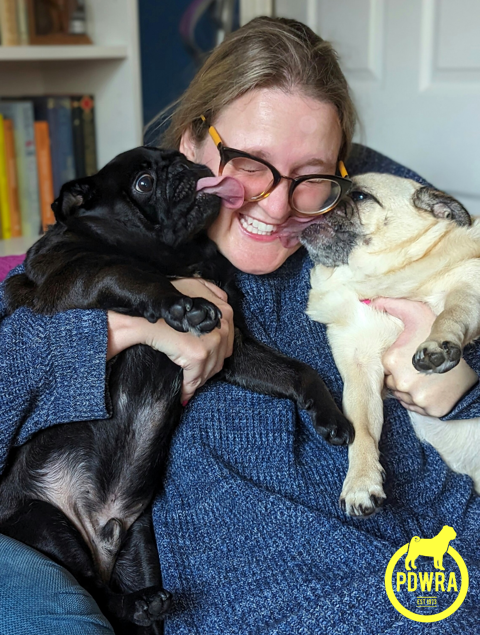
Can you tell us a little bit about your lovely pugs?
I would LOVE to!
Maverick J Maverickson – Now Maverick is technically a Frug, so he has some French bulldog qualities (mostly the windy parts). His ears are amazing, and we have a whole folder of photos of just them…. Maverick is what you call a ‘velcro’ dog, we are rarely apart. He sleeps with us as my ‘little spoon’, and I often take him to London for work or to most places really as he’s so well behaved. He can do some tricks and his favourite toys are the ones he can chew. Maverick has ‘big emotions’ so we help him channel them into games or activities to help him process them.
Mrs Elsie Custard – Elsie is hilarious. I’ve had girl pugs before, but none as funny as her. She’s always up for a game, loves to run around, but also gives excellent cuddles and kisses. Her ‘teefs’ are famous, and she gets stopped a lot when we’re out so people can tell her ‘How pretty’ she is. She likes to shout at birds and roll in smells, but you cannot tell her she’s wrong because this is Elsie’s world and we’re all just living in it. My favourite thing about Elsie is that she can hear a treat packet from seven miles away and you MUST share.
Dr Frank Frankles MD – Oh Frank. He is SUCH a vibe. Frank is our calm, collected young man. Although if you try and watch anything on TV with an animal, he goes mental! Frank has had some health issues since he came to us – his body makes crystals in his pee – so he’s on a special diet. He also has tiny ear canals, so we must be extra vigilant for infection. Frank LOVES water, so naturally we bought him a 10-foot blow up pool last summer, he’s learning to swim! He also enjoys all squeakers, so for Christmas we got him a bag of 100 of them which he had ‘killed’ by January 15th !!
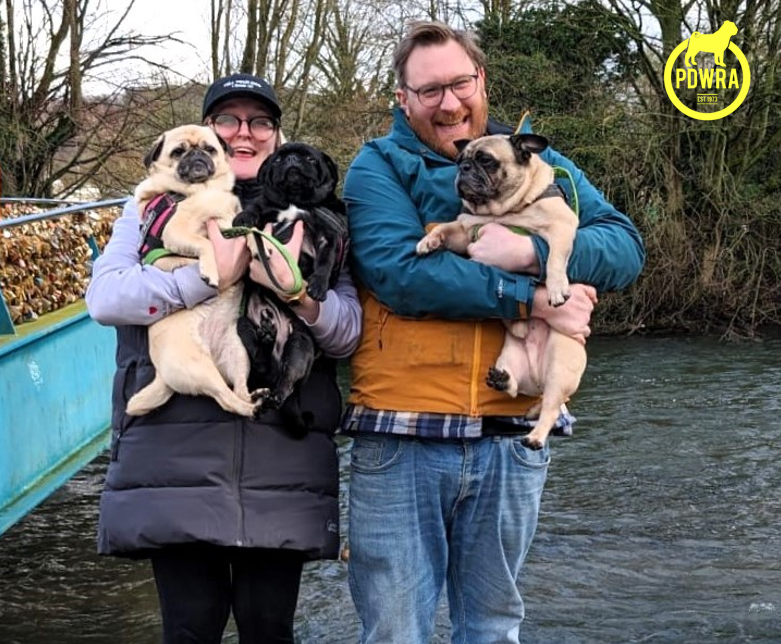
How did you find the adoption process?
So smooth and professional. Lisa is our area manager, and although we’ve never met I count her as one of the best people in our lives because she brought our hairy family together. She checks all the details about what the pugs need and she’s always there if we need to ask questions or just send her cute pictures!
I love that you can sometimes get to meet the pugs and their fosters first as you can see how they are doing with the big changes and chat about everything before you decide. Everything is checked – you don’t have to worry that you’re not being given all the information or won’t be able to ask questions.
Is there anything you think prospective adoptive parents should know?
I think while pugs are easier dogs than others in terms of their temperament, they need more than an average amount of attention. We are very lucky that I work from home, so I am here for our three all day, but I think checking that you are going to be around enough for your pugs is always a good idea.
Pugs also come with their own idiosyncratic health issues – so insurance or putting money aside is wise. The PDWRA share some great articles on health tips, but I also think reading up on pugs or joining some local groups is a great idea if you’re new to the breed.
Make friends with your vet if you can. We pop in sometimes just for cuddles or treats so the pugs don’t always associate the vet with bad things. We also find it makes things easier with health checks and dreaded nail trimmings if the pugs feel more relaxed than stressed out at the vet.
When you’re ready to adopt, I would also say it’s good to go in with an open mind. Rescue pugs can have various back stories and perhaps they aren’t what you imagined when you dreamed of having a dog – but to me that makes them even more special because they are going to bring you a lot of unexpected joy!
What has life been like since adopting your pugs?
Chaotic in the best way. We decided to not have children, so the dogs are very much our kids. We throw them birthday parties, buy them way too many toys, and spend 99.9% of our lives photographing them or telling people about them. We plan everything around them and their happiness and get back so much love (and hair) back.
I am grateful that I get to be their new Mum after they needed to move on. It’s a privilege.
Carolyn.
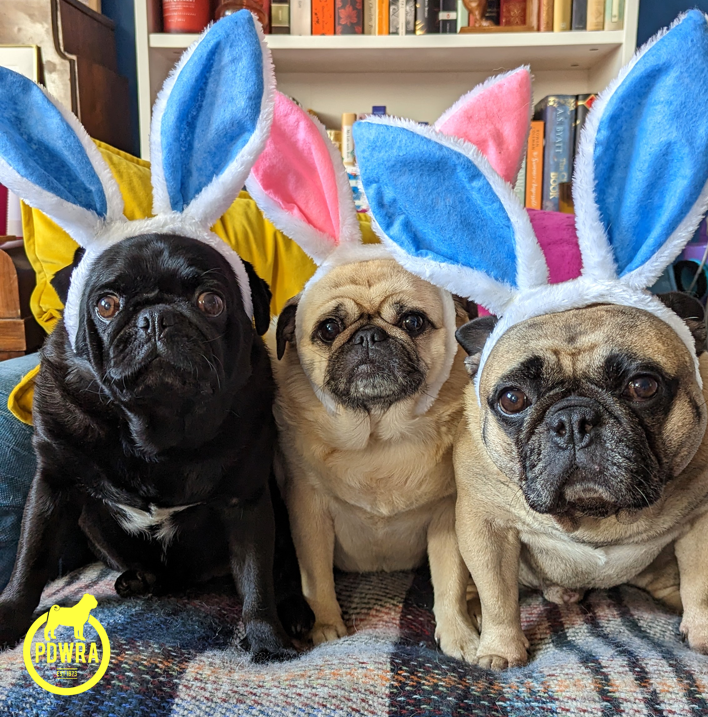
This gang also have their own Instagram account called ‘The Hairy Heslops’, so if you’d like to keep up to date with their adventures, why not give them a follow!
https://www.instagram.com/the_hairy_heslops/
For more information about adopting with PDWRA, please see:
https://pugwelfare-rescue.org.uk/adopting-a-pug/
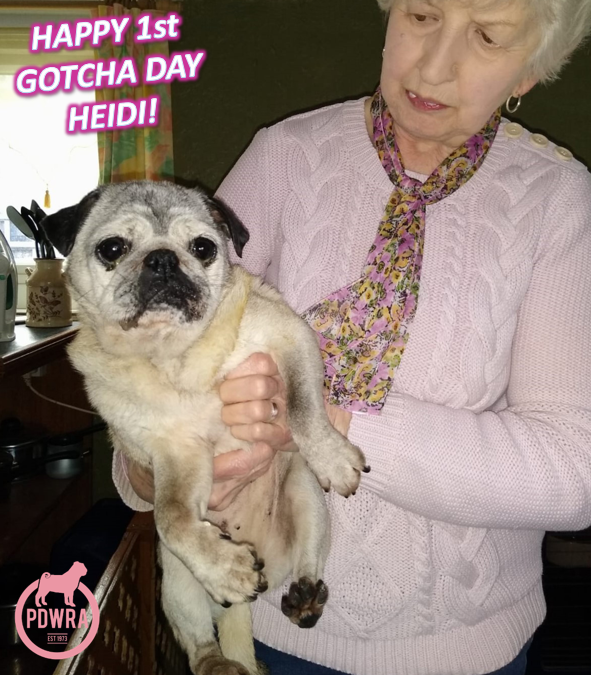
by Yasmin | 4 Apr, 2024 | Blog, News, Rescue Stories, Volunteering
Long-term foster, Heidi’s 1st Gotcha Day:
PDWRA was Heidi’s last chance! Exactly one year ago, now turning 14 year old, Heidi found her forever home with dedicated PDWRA volunteer, Maureen, who has had a lifetime’s experience with pugs.
Poor Heidi was rescued from an awful lifestyle with obvious signs of neglect. Weighing less than 4 kilos, with chronic infections, found to be totally blind and deaf. Who other than welfare would take her on?
“Well one year later as my long term foster, Heidi is enjoying every moment of her life despite her disabilities and loves all her resident companion Pug friends”. says Maureen.
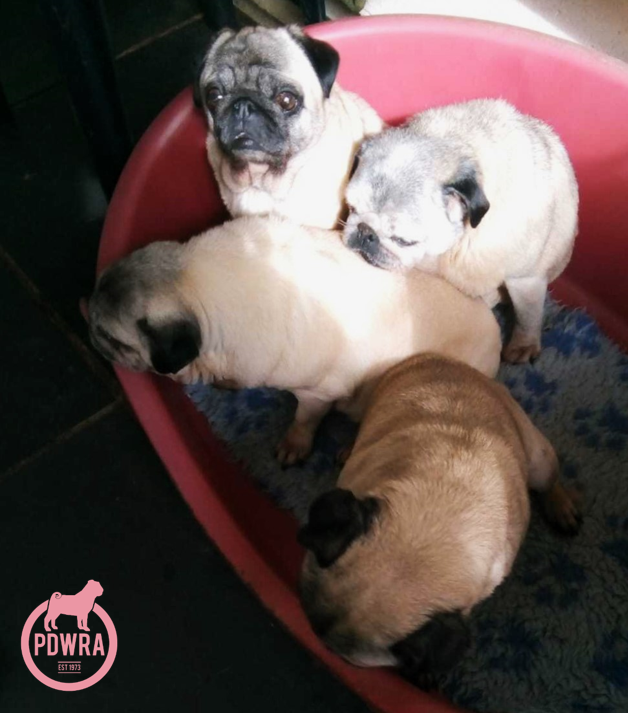
“Heidi is well, she’s such a special pug, her diligence, you know. And I think if you can make people aware that, even if it’s only for a short time, it makes them happy, then it’s worth it.”
Despite her challenging past, Heidi’s resilience and playful spirit have shone through under Maureen’s expert care and experience. This started from childhood where her late Uncle bred pug’s and was well-known in the show world in the 1950’s.
Heidi has thankfully gone from strength to strength.
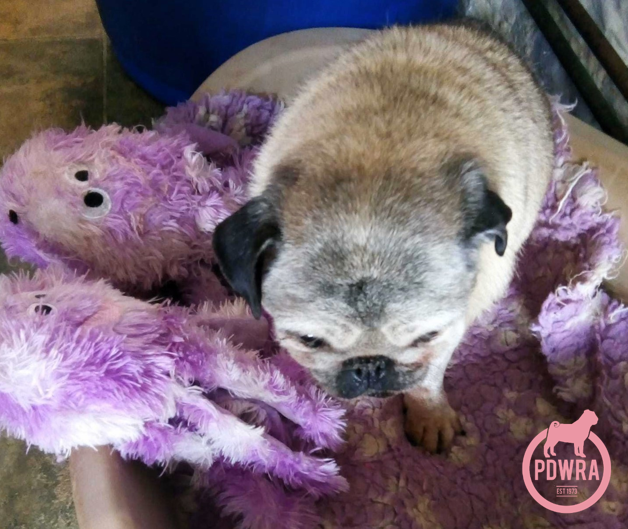
Let’s celebrate Heidi and the countless other pugs who have found love and happiness in their loving homes with the PDWRA!
Stay tuned for Maureen and Heidi’s stories in our upcoming newsletter! Maureen has an amazing family history revolving around pugs, from rescuing to showing, including at Crufts! While Heidi’ has had an incredible journey since coming into Maureen’s care!
Subscribe to our e-Newsletters! | The Pug Dog Welfare & Rescue Association (pugwelfare-rescue.org.uk)
Could You do what Maureen does?
Fostering | The Pug Dog Welfare & Rescue Association (pugwelfare-rescue.org.uk)
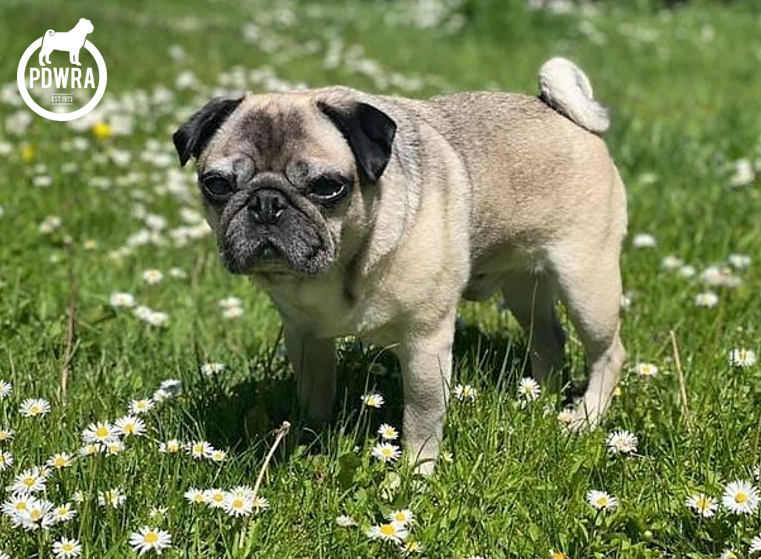
by Yasmin | 2 Apr, 2024 | Blog, News, Pug Health
Written by Helen McKee (MRCVS), PDWRA Vet Advisor:
Atopic Dermatitis (Itchy skin)
Atopy is a condition where the body has an allergic reaction to certain substances (like pollen and household dust), and in dogs, it’s expressed as itchiness of the skin (atopic dermatitis). The immune system reacts inappropriately when the dog comes into contact with allergens to which it is allergic and this leads to the skin becoming itchy. Once the dog starts to damage the skin by scratching and rubbing, secondary bacterial and yeast (Malassezia) infections commonly develop.
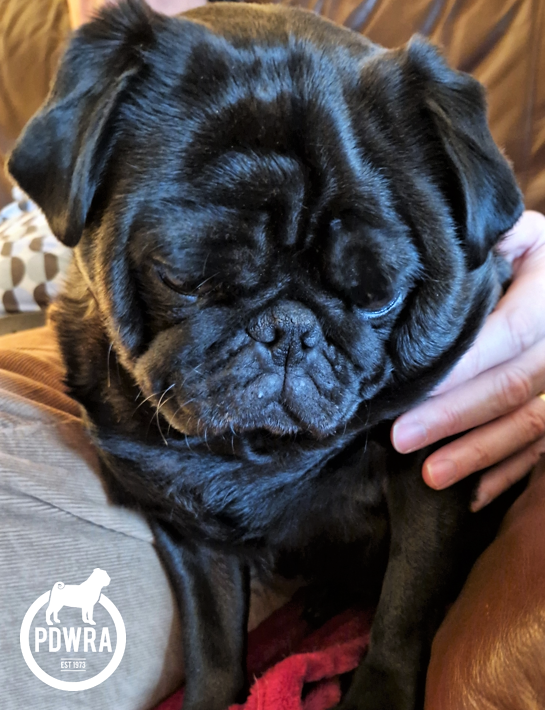
These dogs have a genetic predisposition to develop allergies and unfortunately, it is a condition we see all too commonly in pugs. It is generally caused by inhaling allergens, but less commonly, can also be due proteins in the diet (food allergy).
The main sign is the dog scratching excessively; they can also rub along on their bottom which can be mistaken for anal gland problems. The skin can be red, flaky or with little bumps on it.
Ears are likely to be irritated and inflamed. Because of a pug’s narrowed ear canals, and their enclosed (and moist) nature, it can often result in ear infections.
If left untreated, a dog can become more itchy (pruritic) and develop secondary signs, such as hair loss, thickening (lichenification) and/or blackened skin. Ear canals can be become inflamed, swollen and thickened causing further narrowing of the ear canal.
The first step is to ensure that the itchiness is not being caused by parasites, such as fleas or mites. Ongoing effective flea treatment is important; many of the flea treatment products on the market now also work against mites (such as Bravecto).
Depending on the severity of the condition, a vet may do a skin scraping to to look for mites and secondary infections such as fungo. Once parasites are ruled out, any excessive growth of bacteria and/or fungi need to be treated. Often this is by the use of a medicated shampoo such as Malaseb.
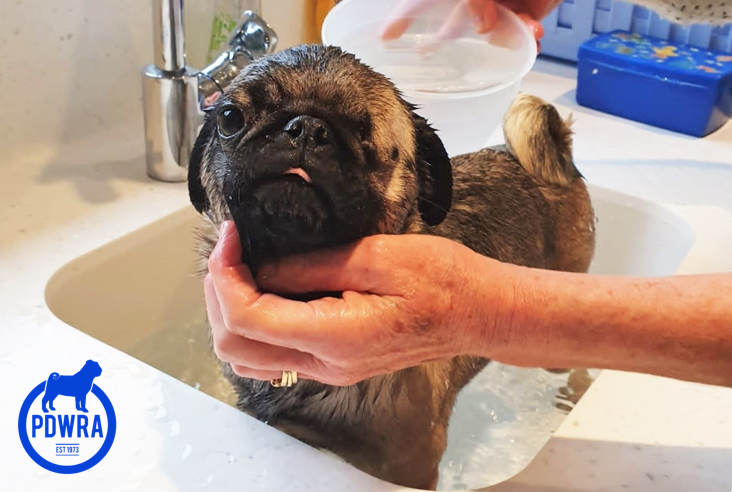
It is also important to treat any associated ear infections. Again, the vet make take a swab of the ear, and look under the microscope. If they see bacteria, especially rod shaped ones (which can be a nasty bacteria) they may go on to culture. Treatment can involve both local treatment (drops into ears), which can be as long as 6-8 weeks in serious cases, and tablets, depending on severity.
Once under control, it is vitally important that ears are part of the ongoing management of the atopy, as ear canals can become so thickened that they block the ear canal resulting in deafness. If this occurs, an expensive operation to remove the ear canal (TECA) may be needed to prevent infection spreading into the middle and inner ear (head tilt, dizziness) or in the most extreme cases, reaching the brain.
Once a diagnosis of atopic dermatitis is made, it can then be treated. The condition does not go away, but generally can be controlled with ongoing management.
If a dog is under 12 months of age, then it is more likely to be food related. If it develops after one year of age, then more often that not, it is due to breathing in allergens like pollen.
The easiest way to rule in (or out) an allergy to certain foods, is to exclusively feed hypoallergenic food for a minimum of 6 weeks. Although these specialised foods are expensive, in my opinion, it is worth the cost to find out if food is a factor in the dog’s atopic dermatitis. There are only three commercially available hypoallergenic diets (where the protein is hydrolysed in the food so the body doesn’t react to the protein), and these are produced by Purina, Royal Canin and Hill’s.
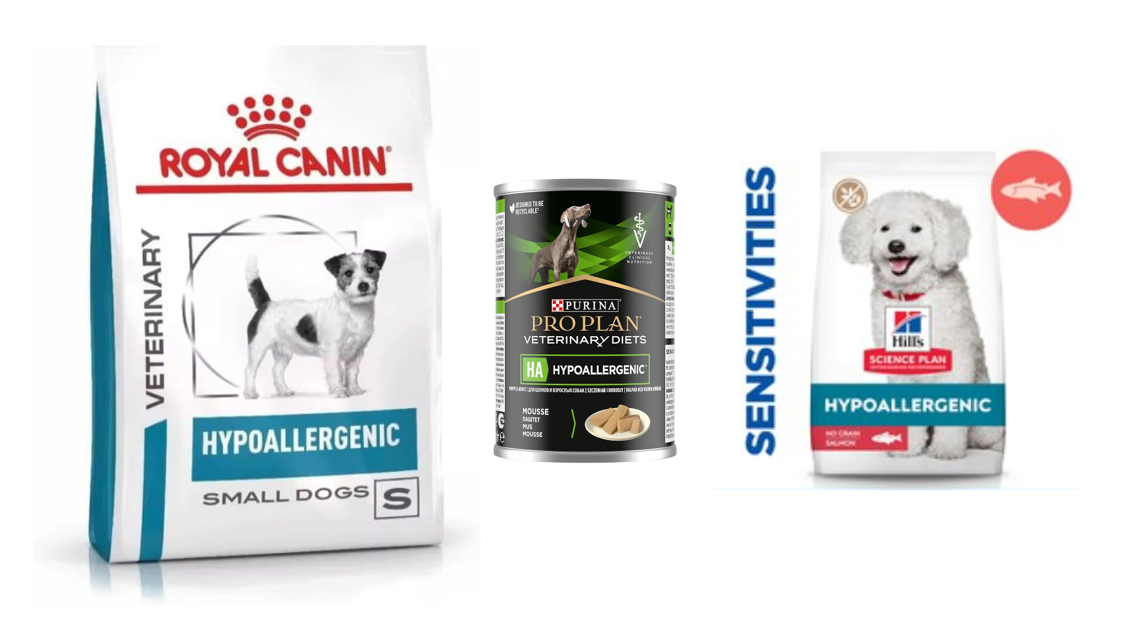
If the condition improves on the diet (without concurrent medication) it gives a positive diagnosis and the dog will need to remain on the diet.
Some vets may suggest blood tests to ascertain the proteins a dog is allergic to, but unless considering immunotherapy, dermatologists can often feel they are not needed and can incur unnecessary extra costs too.
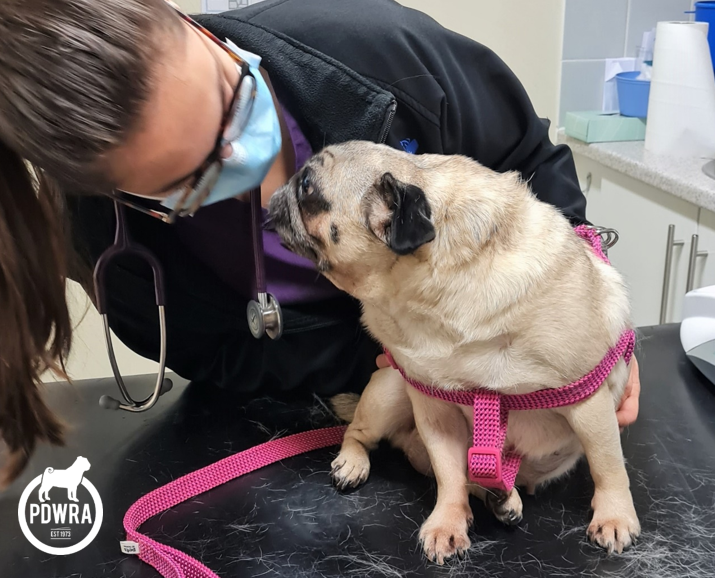
There are a number of drugs that can be used to treat atopic dermatitis. Traditionally, steroids were used but they can have bad side effects.
More modern drugs (with less side effects) include Cytopoint, a monthly injection, and Apoquel, a tablet.
Regular medicated shampoo baths, along with the use of ear flushing products are often used alongside the medication, to control the atopy.
If the symptoms persist despite the use of Cytopoint or Apoquel, I would recommend being referred to an Advanced Practitioner or Specialist in Dermatology to ensure the diagnosis is correct and optimal treatment is given.
This is by no means an exhaustive article, merely a summary of atopic dermatitis which I hope will give a better understanding of the condition.
Helen McKee (MRCVS)
PDWRA Vet Advisor
For further pug health related articles please see: Pug Health & Wellbeing | The Pug Dog Welfare & Rescue Association (pugwelfare-rescue.org.uk)
Pug Health & Wellbeing
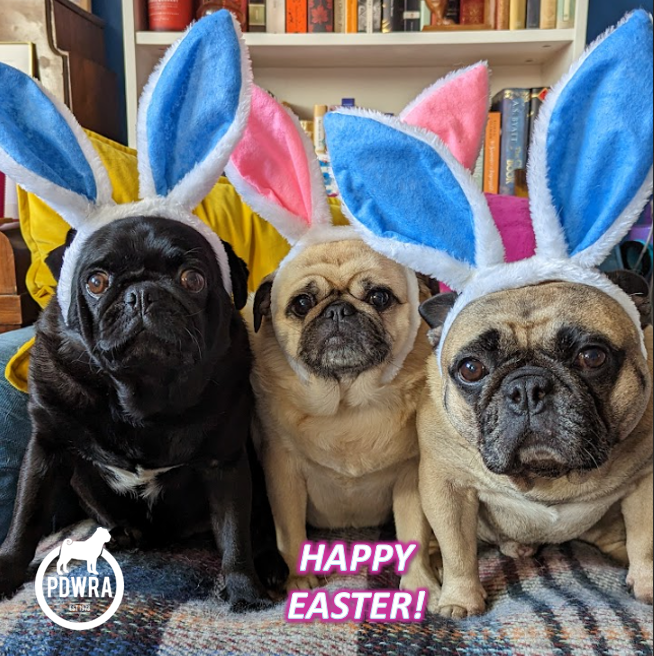
by Yasmin | 31 Mar, 2024 | Blog, News, Rescue Stories
WISHING ALL OUR VOLUNTEERS & SUPPORTERS A HAPPY EASTER!
Carolyn, proud PDWRA Mum who features her pugs on Instagram (The Hairy Heslops), has provided this wonderful photograph for us to celebrate Easter.
Here’s their Instagram link to follow them: – https://www.instagram.com/the_hairy_heslops/
We shall be featuring them in our next newsletter, so look out for it!
Also, Lynda, another proud PDWRA Mum, has shared this lovely photo of Superstar Eddie, who we’ll also have an update on, following his dedicated training!
Lynda is a dog trainer & behaviourist, also found on Instagram at: https://www.instagram.com/puppydogtails.co.uk/
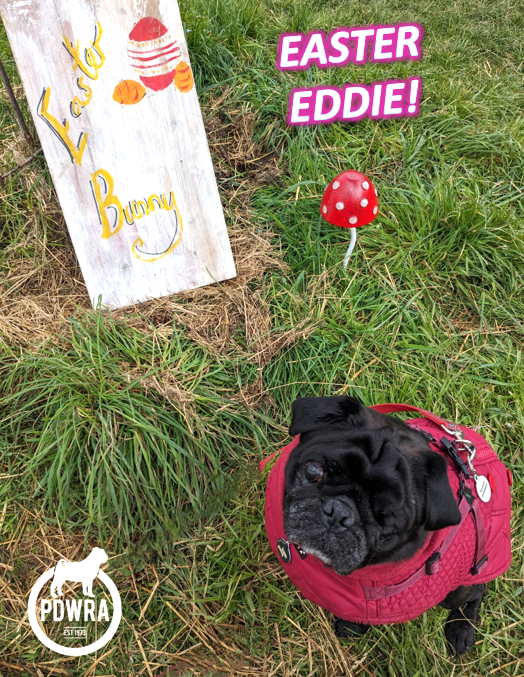
EDDIE : https://pugwelfare-rescue.org.uk/ready-eddie-go/
And here he is with Billy Bob, turning 6 months and training to be a pets therapy dog as well!
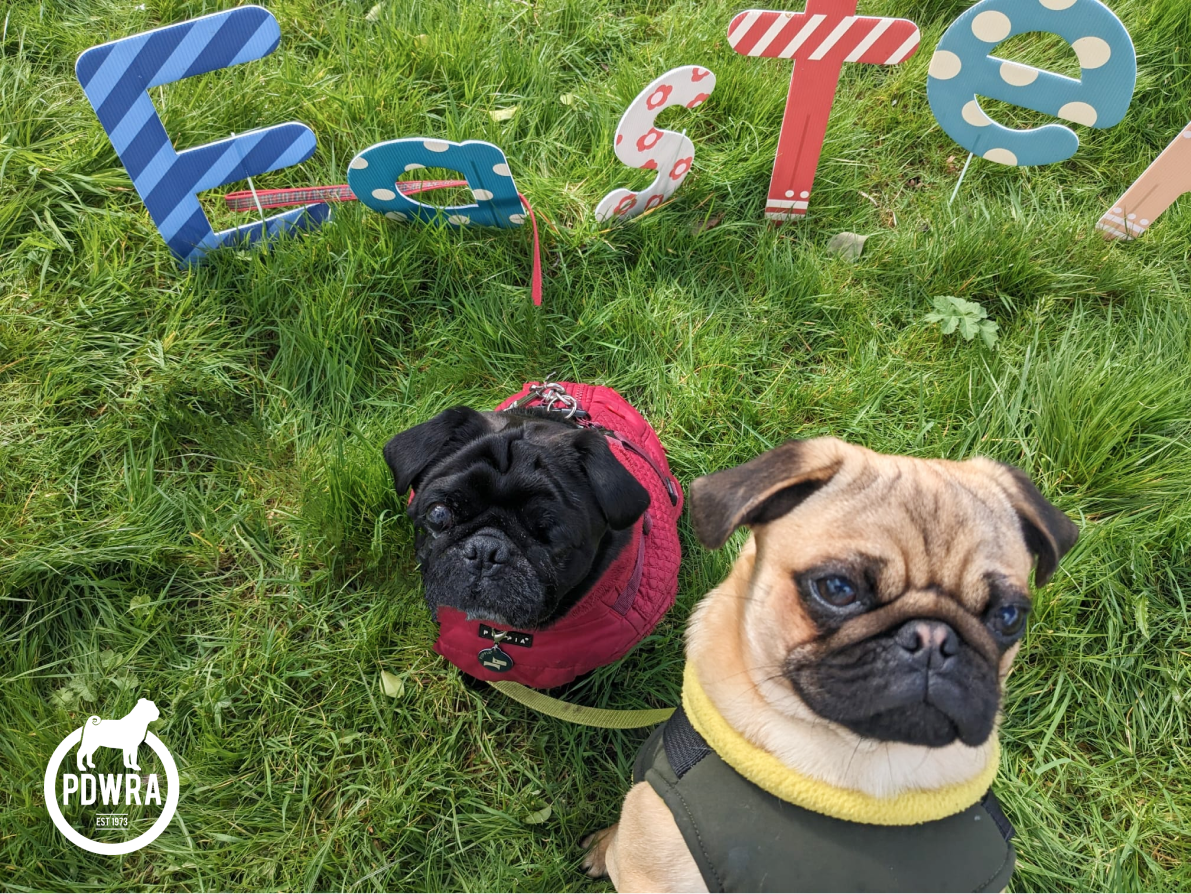
If you aren’t already signed up, go to : Subscribe to our e-Newsletters! | The Pug Dog Welfare & Rescue Association (pugwelfare-rescue.org.uk)






















